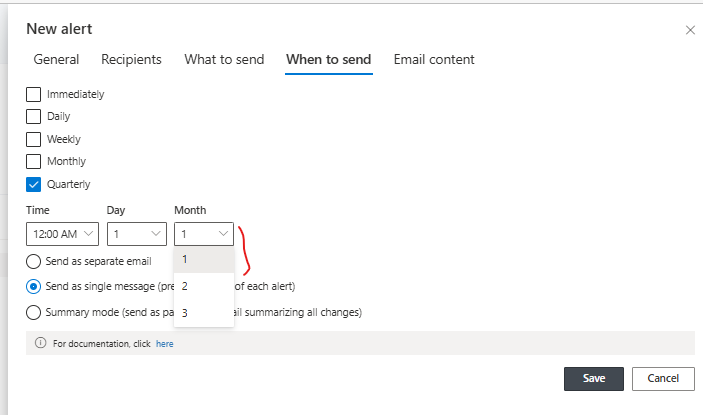You can choose to receive alert immediately once the trigger event happens or you can postpone the alert to a specific time of day or a specific day of week.
- Immediately– the alert is sent immediately. You can choose to always send the message straight away, or only do it during business hours. In this case, the alerts outside business hours are send in the beginning of the next business period (e.g. Monday morning)
- Always – alerts are sent as they are generated
- Business days – select the business days and business hours to send the alerts immediately
- Daily – alerts are sent at once a day, at the time of your choosing. You can set business days during which the alerts are sent; otherwise the system waits for the next business day.
- Weekly – alerts are sent once a week, on the day and time of your choosing.
- Monthly - alerts are sent once a month, on the day and time of your choosing.
- Quarterly - alerts are sent on the day and time and on the month selected within the calendar quarter of your choosing.

When using Daily or Weekly alerts, you must specify time [and weekday] for the alert. When immediate alerts are generated outside of business hours, it is send only in the beginning of the next business day, the time and weekday settings do not apply to immediate alerts and they are not enabled when these alert types are selected.
When an alert is sent according to date column or when it is not sent immediately, you can choose the mode of how the alert is sent.
- Send as separate email – each alert message is sent separately
- Send as single message – all alert messages going out to the same people at the same time are combined into a single message. The body of each individual message is preserved as specified in its mail template, the messages are stacked in a single message.
- Summary mode – all alert messages going out to the same people at the same time are combined into a single message. Each message is shown as a single line of text, e.g. [Title] has been added by John Smith: 1/1/2012 09:30 AM. Mail templates are not used in this mode. Note that the date format will be according to your site’s regional settings. Also, note that in Summary mode a "After Change" part of a condition will be assessed as if the condition was set to "Always".
Get helpful videos
Last modified: 5/9/2025 9:07 PM
Loading...
Add your comment
Comments are not meant for support. If you experiencing an issue, please open a support request.
Reply to: from